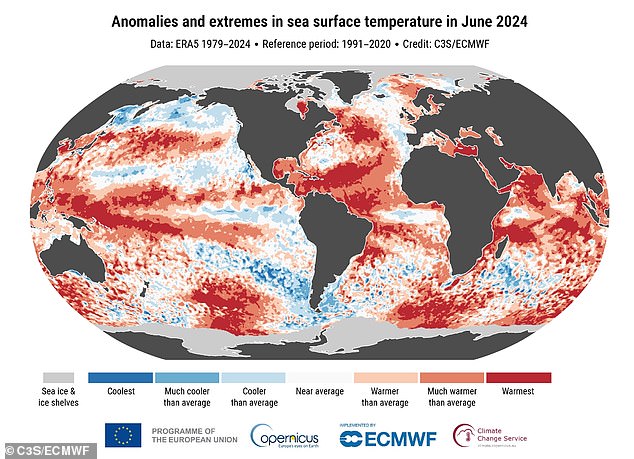Globally, Earth sizzled its way through the hottest June on record, according to scientists at the EU's climate change programme.
In Britain,June was a 'month of contrasts' with drizzle and a late burst of heat.
But globally,Earth sizzled its way through the hottest June on record,according to scientists at the EU's climate change programme.
Last month was not only the hottest month of the year so far,but alsoo the 13th consecutive record-breaking month.
In other words,every month since June 2023 has been the hottest ever recorded for that particular month – signifying an ongoing warming trend.
Experts point to greenhouse gas emissions as the cause and warn of an ongoing 'climate disaster'.
Your browser does not support iframes.

Long periods of hot,dry weather and a lack of rain make wildfires more likely. Pictured,a firefighting helicopter drops water as a wildfire burns in Stamata,near Athens,Greece,June 30,2024

Looking at Europe separately from the rest of the world,temperatures last month were 2.82°F (1.57°C) above the 1991-2020 average for June – making it the joint-second warmest June for Europe.
European temperatures were most above average over southeast regions and Turkey,but near or below average over western Europe,Iceland and northwestern Russia.
Outside of Europe,temperatures were most above average over eastern Canada,the western US and Mexico,Brazil,northern Siberia,the Middle East,northern Africa and western Antarctica.
CS3 also revealed that the the global average sea surface temperature (another metric that measures heat close to the ocean's surface) was 20.85°C last month,the highest value on record for the month of June.
This is the fifteenth month in a row that the sea surface temperature has been the warmest in the data record for the respective month of the year.
Your browser does not support iframes.
Responding to the new record for June,environmental non-profit Greenpeace said 'polluters should pay the mounting bill' for extreme weather.
It points the finger at the fossil fuel industry,which emit greenhouse gases such as CO2 and methane by burning fossil fuels like coal,gas and oil.
'The fossil fuel industry is causing widespread and irreversible loss and damage by continuing its operations while ignoring climate impacts,' said Avinash Kumar Chanchal at Greenpeace South Asia.
'Our communities are already bearing the worst consequences of heatwaves,including health risks,deaths and livelihood crises,especially among the most vulnerable,
'Marginalised groups,including women,children,senior citizens,low-income communities,labourers and outdoor workers,suffer the most.
'These people often do not have the money or resources to cope with such a climate disaster.'
Looking specifically at the UK, Brits saw 'below average' temperatures in June despite a late heatwave,the Met Office revealed last week.
In the UK specifically,June was a 'month of contrasts' for many,with a cool first half of the month offset by warmth later in the month,with rainfall also in relatively short supply,especially in the south.
Solar - light and heat from the sun.
Wind - through wind turbines to turn electric generators
Hydro - captured from falling or fast-running water
Tidal - energy from the rise and fall of sea levels
Geothermal - energy generated and stored in the Earth
Biomass - organic material burnt to release stored energy from the sun
Although nuclear energy is considered clean energy its inclusion in the renewable energy list is a subject of major debate.
Nuclear energy itself is a renewable energy source. But the material used in nuclear power plants - uranium - is a non-renewable.
Fossil fuels
Renewables contrast with the more harmful fossil fuels - oil, coal and gas.
They are considered fossil fuels because they were formed from the fossilised,buried remains of plants and animals that lived millions of years ago.
Because of their origins,fossil fuels have a high carbon content,but when they are burned,they release large amounts of carbon dioxide,a greenhouse gas,into the air.
Source: EDF Energy /Stanford University
Earth

© Voice Of Zimbabwe Privacy Policy Contact us